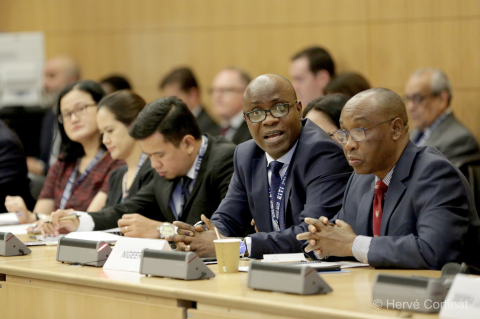
At the 1st session of the US Senate Foreign Relations Committee, Senator Richard Lugar (R-IN) stated that he is preparing to introduce legislation to include US implementation of the EITI with bipartisan co-sponsors, including Senator Cardin (D-MD). Robert Hormats, the nominee for Under Secretary of State for Economic, Energy, and Agricultural Affairs, called the EITI “one of the very, very innovative and very important developments that's taken place over the last several years”.
Here are parts of the transcript from the hearing:
HEARING OF THE SENATE FOREIGN RELATIONS COMMITTEE
10 September 2009
Federal News Service
I want to mention that I've been working with our chairman, Senator Cardin, to introduce a bill entitled Energy Security Through Transparency. And the bill would do a number of things. One, it would allow Americans to clearly see payments made to our own government from extraction from federal lands, but equally importantly, it would encourage international cooperation to permit citizens in resource-rich countries to have information about the funds sent to their governments.
Awhile back when the Baku-Ceyhan pipeline was about to start up, I had the privilege of visiting with the president of Azerbaijan, and I asked him, what kind of accounting will you make to the people of your country? And he said well, that's a good question; we've thought about that and we thought we would adopt the Norway plan.
Well, I said, all things considered, that's a pretty good plan.
Now, I mention that because the president did follow through, and in subsequent visits there are a good number of very gifted young Azeris who are making regular reports of the huge amounts of money that has suddenly sometimes doubled and tripled the GNP of Azerbaijan year by year due to the pipeline activities.
But that success story is not replicated often. And with that you would have no idea about our legislation necessarily, but you've mentioned in your opening statement this problem of transparency and it's in these energy resources and the extractive industries that great sums of money are available to somebody in various countries.
It is difficult to imagine the flourishing of democracy, human rights and all the rest without there being this sort of accounting. Can you give some idea just from your own large experience in this area how you might be effective in helping this process?
MR. HORMATS: Yes. Thank you, Senator.
This is a very important area from my point of view. The Extractive Industries Transparency Initiative is one of the very, very innovative and very important developments that's taken place over the last several years for all the reasons that you have mentioned.
It's important for several reasons. One, in certain countries where the money from an extractive industry goes to foster corruption, it deprives the government of resources that could be used for the benefit of the entire population.
Second, in certain areas like Eastern Congo, a lot of that money goes to fund warring factions, as it does in other parts of the world. Third, it creates an environment of general corruption so that others seeing this believe that they can engage in corruption in other ways.
And fourth, it, as you pointed out earlier, is a national security issue in some senses because where there's discontent in an area because the money is not going to the average person for education or for food or for housing or for water development and it goes to some corrupt source, people become restive. They become angry. They become rebellious against their government for not cracking down hard on corruption. And therefore, it is an extremely important problem with very pervasive implications.
And the kinds of things I would do if I were confirmed in this job would be to make this a very important priority in conversations with other countries in the sense that countries that were not adhering to this would emphasize the importance of doing that for their own reasons and for the reasons of their own population and because it's an important priority for us.
I would also make the point -- and there are some countries that pay very little attention to this; China is an example -- when they provide money to other countries don't really insist on accountability or transparency, other things, and they weaken the whole concept of this. When the United States is trying to do this and says well, we'll provide money or our companies will provide money if you'll provide the kinds of information needed under this initiative and they don't, it makes countries think well, they don't have to do it. They can provide -- they can find other alternatives to this and, in effect, evade the process. So I think that is a very important part of this and, from my point of view, a very important priority. It's too little understood in many parts of this country how important that is. And I know you and Senator Cardin have been, and other senators, have been very actively involved in issues like this. And I regard it as a very important -- something, if confirmed, I will sp a great deal of time on, I can assure you.
SEN. LUGAR: Well, I think that's very important. We really appreciate your leadership and your commitment.
You've mentioned your own experience in Africa, likewise in China. We've talked about that already in the hearing. But Bloomberg this morning has an interesting story that the China National Petroleum Corporation, which is the parent of the world's largest company, in China has obtained a $30 billion loan from the China Development Corporation, that's the Chinese government -- MR. HORMATS: Right.
SEN. LUGAR: -- to pursue even more vigorously sources of oil and natural gas throughout the world. This is not the first investment. This is simply an additional increment. But it leads to my question and I've touched upon this in the opening statement. You will be, I'm sure, in touch with the energy coordinator in the State Department, Mr. Goldwyn, who has been appointed.
MR. HORMATS: Yes.
SEN. LUGAR: But between the two of you, will you be able to track really who is doing what in the world? Currently, if you come to a country such as Libya or now maybe even Iraq as it opens up, the competition, not only with the Chinese but from India and from others, it's almost counterintuitive.
In one committee, we talk about climate change, CO2 and so forth. But in the real world, in another committee, we're talking about extraordinary commitments by governments to find oil which is going to be used and is going to enhance the economy and it's going to create CO2. It's a strange world in that respect. But this is one that your responsibility, I suspect, is to track -- MR. HORMATS: Yes.
SEN. LUGAR: -- to advise our president, our secretary of State, us in the Congress, about who's doing what in the world and what we are likely to face and those implications.
And so I ask you once again -- I appreciate the commitment you've made in your statement, but these are issues I know that you follow, and do you have any further comments on that?
MR. HORMATS: Yes. Thank you very much, Senator, for that question.
I do follow it and I do regard it as extremely important because it can evade the whole concept of what we're describing. And one of the things that I int to do with China and India and others that have large amounts of money to sp on, and are sping money on, resource development in various parts of the world, in Africa and many other continents, to try to emphasize to them that it is in their interest as well as in our interest to be much more rigorous about this process, because, after all, they have an interest in stability, too. And they need to try to find, to the extent they can, a formula which enables a clearer set of information flows on where the money is going and how it's spent, because over a period of time, if they invest large amounts of money and the people find that that money is not being used for their benefit, is not going to the governments which are using it to provide basic needs for their people, there is going to be a reaction to them. They're not immune from this. And, therefore, I do think that it's very important.
(…)
SEN. SHAHEEN: I want to go back and follow up on the conversation you had with Senator Lugar about the effort to help other countries see that it's in their best interest to encourage transparency in the extraction of natural resources, because, while I appreciate that's an important conversation to have with them and that job owning should be part of what we're doing, what happens when that doesn't work, when countries don't see that it's in their interest to be more transparent? Then what other tools do we have that we can use to move them in the direction that -- of more transparency?
MR. HORMATS: Well, in some cases it's hard to find the kind of tools we would use -- for instance, a trade dispute where you really have penalties set out in the WTO.
But I do think that it's, that America should constantly reinforce the importance of this and not let it drop. In other words, if we don't get a satisfactory answer, come back again and again and try to convince them of the logic of this kind of thing. And I think that would be very useful. I don't see any specific measures, but I do think there would be helpful measures that could be utilized.
SEN. SHAHEEN: Thank you.
MR. HORMATS: Thanks.
SEN. CARDIN: Let me just point out on Senator Sheehan's last point, we do have a mechanism, the EITI.
MR. HORMATS: Right.
SEN. CARDIN: As Senator Lugar pointed out, it is an international mechanism. It is one that needs to be strengthened.
It's one that we need to work in our international organizations, whether it's the United Nations or OSCE, to get stronger membership and compliance and strengthen the existing mechanisms that are in place.
I just really want to underscore the point, I think, that Senator Lugar made about the transparency issues but also the fact that the current economic crisis makes it even more pressing that the resources in developing countries are made available to its people for stability and for growth. And so I think it's even more urgent today that these issues be given priority in your portfolio. I also think about the international labors issues. There's a lot of people who need to travel to other countries in order to make a livelihood for their families in which they then s money back to their families, and, in these tough economic times, there's greater concern of abuse. We had the issue in the Helsinki Commission on trafficking, which is not just girls and women but it's also laborers who are trafficked inappropriately and abused.
All these I think are going to be challenges that you're going to need to confront in your portfolio, particularly in these tough economic times. So I just ask that you continue to give these issues the priorities that they deserve and look for innovative ways to strengthen the U.S. influence internationally on these issues.
MR. HORMATS: Thank you. I will do that.
Связанные материалы





